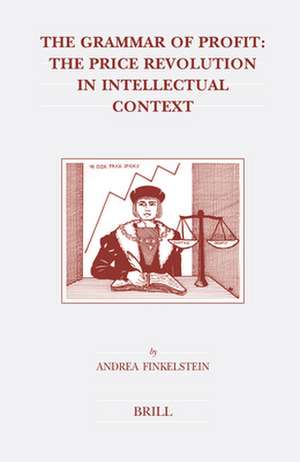The Grammar of Profit: The Price Revolution in Intellectual Context: Brill's Studies in Intellectual History, cartea 138
Autor Andrea Finkelsteinen Limba Engleză Hardback – 25 ian 2006
Din seria Brill's Studies in Intellectual History
- 18%
 Preț: 984.01 lei
Preț: 984.01 lei - 18%
 Preț: 935.71 lei
Preț: 935.71 lei - 18%
 Preț: 540.82 lei
Preț: 540.82 lei - 18%
 Preț: 930.18 lei
Preț: 930.18 lei - 18%
 Preț: 676.34 lei
Preț: 676.34 lei - 18%
 Preț: 680.76 lei
Preț: 680.76 lei - 18%
 Preț: 685.35 lei
Preț: 685.35 lei - 18%
 Preț: 681.85 lei
Preț: 681.85 lei - 18%
 Preț: 666.75 lei
Preț: 666.75 lei - 18%
 Preț: 675.94 lei
Preț: 675.94 lei - 18%
 Preț: 679.13 lei
Preț: 679.13 lei - 18%
 Preț: 675.79 lei
Preț: 675.79 lei - 18%
 Preț: 684.75 lei
Preț: 684.75 lei - 18%
 Preț: 685.11 lei
Preț: 685.11 lei - 18%
 Preț: 686.82 lei
Preț: 686.82 lei -
 Preț: 232.42 lei
Preț: 232.42 lei - 18%
 Preț: 1025.52 lei
Preț: 1025.52 lei - 18%
 Preț: 686.22 lei
Preț: 686.22 lei - 18%
 Preț: 682.78 lei
Preț: 682.78 lei - 18%
 Preț: 669.19 lei
Preț: 669.19 lei - 18%
 Preț: 677.34 lei
Preț: 677.34 lei - 18%
 Preț: 678.97 lei
Preț: 678.97 lei - 18%
 Preț: 677.10 lei
Preț: 677.10 lei - 18%
 Preț: 677.49 lei
Preț: 677.49 lei - 18%
 Preț: 676.82 lei
Preț: 676.82 lei - 18%
 Preț: 675.90 lei
Preț: 675.90 lei - 18%
 Preț: 676.95 lei
Preț: 676.95 lei - 18%
 Preț: 680.55 lei
Preț: 680.55 lei - 18%
 Preț: 677.57 lei
Preț: 677.57 lei - 18%
 Preț: 1036.64 lei
Preț: 1036.64 lei - 18%
 Preț: 676.48 lei
Preț: 676.48 lei - 18%
 Preț: 680.76 lei
Preț: 680.76 lei - 18%
 Preț: 680.13 lei
Preț: 680.13 lei - 18%
 Preț: 670.77 lei
Preț: 670.77 lei - 18%
 Preț: 674.79 lei
Preț: 674.79 lei - 18%
 Preț: 679.99 lei
Preț: 679.99 lei - 18%
 Preț: 678.36 lei
Preț: 678.36 lei - 18%
 Preț: 670.83 lei
Preț: 670.83 lei - 18%
 Preț: 681.07 lei
Preț: 681.07 lei - 18%
 Preț: 682.71 lei
Preț: 682.71 lei - 18%
 Preț: 681.98 lei
Preț: 681.98 lei - 18%
 Preț: 679.07 lei
Preț: 679.07 lei - 18%
 Preț: 678.90 lei
Preț: 678.90 lei - 18%
 Preț: 682.32 lei
Preț: 682.32 lei - 18%
 Preț: 572.93 lei
Preț: 572.93 lei - 18%
 Preț: 687.30 lei
Preț: 687.30 lei - 18%
 Preț: 681.61 lei
Preț: 681.61 lei - 18%
 Preț: 681.31 lei
Preț: 681.31 lei - 18%
 Preț: 679.21 lei
Preț: 679.21 lei
Preț: 680.69 lei
Preț vechi: 830.11 lei
-18% Nou
Puncte Express: 1021
Preț estimativ în valută:
130.25€ • 135.99$ • 107.80£
130.25€ • 135.99$ • 107.80£
Carte indisponibilă temporar
Doresc să fiu notificat când acest titlu va fi disponibil:
Se trimite...
Preluare comenzi: 021 569.72.76
Specificații
ISBN-13: 9789004149588
ISBN-10: 9004149589
Pagini: 374
Dimensiuni: 170 x 246 x 29 mm
Greutate: 0.81 kg
Editura: Brill
Colecția Brill
Seria Brill's Studies in Intellectual History
ISBN-10: 9004149589
Pagini: 374
Dimensiuni: 170 x 246 x 29 mm
Greutate: 0.81 kg
Editura: Brill
Colecția Brill
Seria Brill's Studies in Intellectual History
Public țintă
Those interested in intellectual history, history of social, economic, and political theory, and Early Modern European history; academic libraries, institutes, and graduate and upper-level undergraduate students in the subjects listed.Notă biografică
Andrea Finkelstein, Ph.D. (1997) in History, Graduate Center, City University of New York, is Professor of History at Bronx Community College, CUNY. Her works include Harmony and the Balance: An Intellectual History of Seventeenth-Century English Eonomic Thought (Michigan, 2000).
Recenzii
"Finkelstein, who previously published a history of seventeenth-century English economic thought, sets out to discover how the concept of profit evolved under the impact of the great inflation of the sixteenth and seventeenth centuries. (…) If, as the ancients and most early moderns believed, economies were static, then their concept of redistribution in advantageous ways worked. If, however, economies can grow, then all the old concepts must be redefined. As that sank in, different ideas of profit became popular. (…) Finkelstein displays the concept of profit in all its colors."
Norman Jones, Renaissance Quarterly
Norman Jones, Renaissance Quarterly
Cuprins
Acknowledgments
1. Profit and the Price Revolution
2. Body, Mind, and Soul
3. Family Values
4. Master and Servant
5. The Body of Profit
6. Profit and Distributive Justice I: The Sins of the Body
7. Profit and Distributive Justice II: The Sins of the Monarch
8. Profit and Commutative Justice
9. The Modern Problem of Profit: A Paradox by Way of a Digression
10. Conclusion: The Grammar of Profit in an Age of Revolutions
Bibliography
Index
1. Profit and the Price Revolution
2. Body, Mind, and Soul
3. Family Values
4. Master and Servant
5. The Body of Profit
6. Profit and Distributive Justice I: The Sins of the Body
7. Profit and Distributive Justice II: The Sins of the Monarch
8. Profit and Commutative Justice
9. The Modern Problem of Profit: A Paradox by Way of a Digression
10. Conclusion: The Grammar of Profit in an Age of Revolutions
Bibliography
Index
